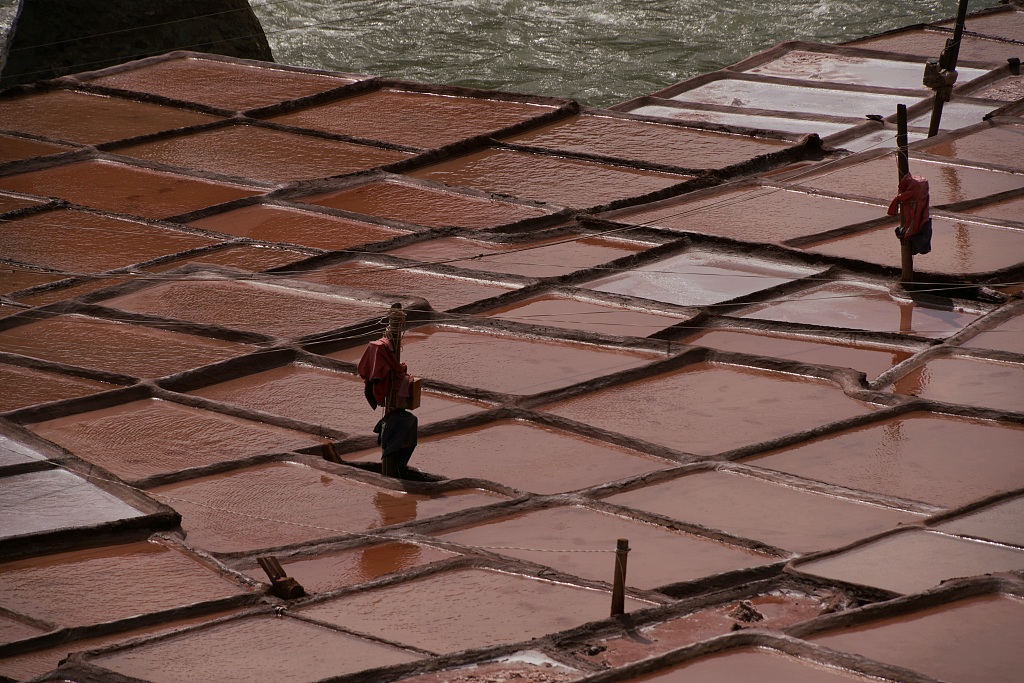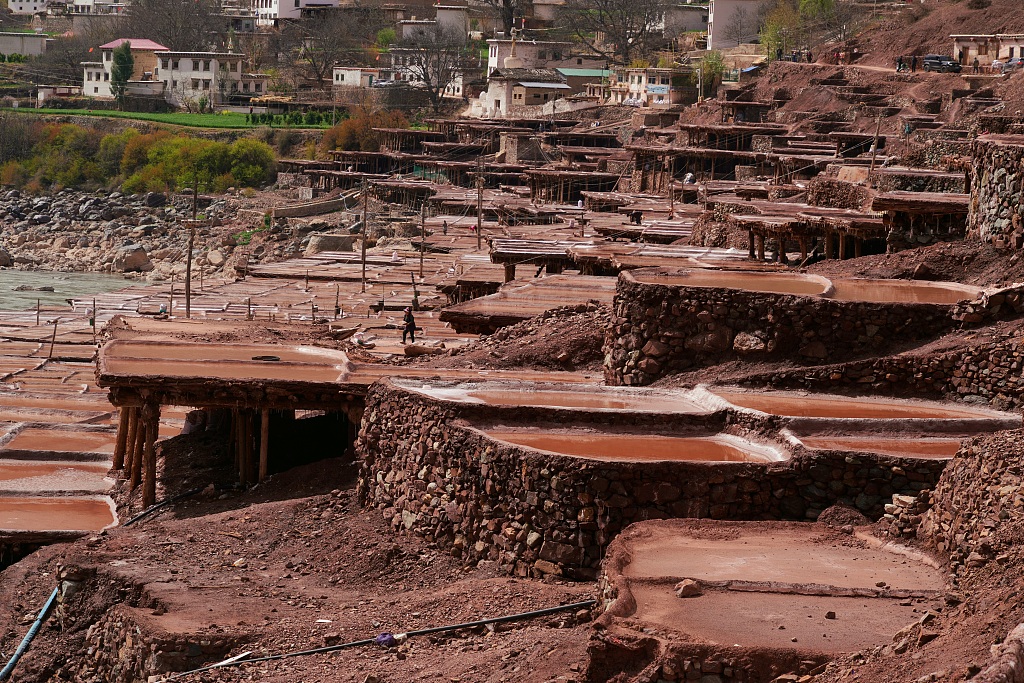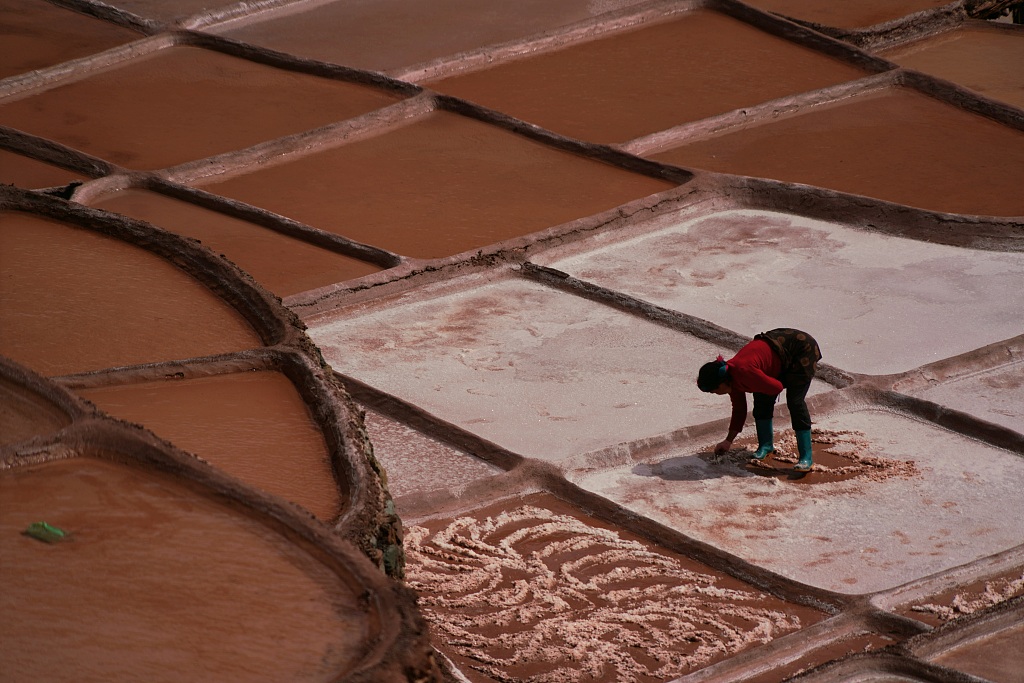
Salt pans in Mangkam County, Qamdo, southwest China's Xizang Autonomous Region. /CFP
Salt pans in Mangkam County, Qamdo, southwest China's Xizang Autonomous Region. /CFP
The city of Qamdo in southwest China's Xizang Autonomous Region began on Thursday to implement a local regulation on the detailed protection of its ancient salt fields, providing legal support for the preservation, inheritance, supervision and management of this item of heritage dating back over 1,300 years.
The ancient salt fields of Mangkam County are spread over a vast area of green fields surrounding the salt wells, displaying the pink-and-white salt that resembles peach blossoms. There are more than 4,300 individual salt fields here, arranged asymmetrically, full of brine and reflecting the blue sky and white clouds.
This is the only place in China where salt is still produced on a large scale using the primitive techniques of the ancient world. In 2008, the sun-dried well salt produced here was added to China's national list of intangible cultural heritage. In 2012, the Mangkam salt fields were placed on the country's tentative list of world cultural heritage sites.

Salt pans in Mangkam County, Qamdo, Xizang. /CFP
Salt pans in Mangkam County, Qamdo, Xizang. /CFP
According to the new protection regulation, a total area of 42.74 hectares, including salt wells, fields and old residential buildings of local salt farmers, is the subject of stringent preservation rules, with the maximum height of buildings restricted to 12 meters.
The document further clarifies legal obligations while providing details on protection, management and proper utilization, with the aim of better promoting the local protection of this item of historical and cultural heritage as well as exploring a sustainable development path for related tourism.
"The valuable skills of salt making in the area and the ancient salt fields are of great natural, historical, scientific, social and cultural value," said Trinle Palmo, head of Mangkam County's culture bureau.
"Nevertheless, as market demand and agricultural production models have changed over the years, the ancient salt wells and fields are facing double challenges in terms of environmental protection and cultural inheritance."
The official added that, according to the regulation, relevant local departments will punish those who engage in activities that negatively affect the safety and surrounding environment of the ancient salt wells and fields.
The regulation also states that, in the process of sun-drying the salt, the local residents are not permitted to arbitrarily change the existing salt field conditions, and must respect the natural ecology and traditions, while continually restoring any damaged or abandoned salt fields.
The document also highlights the improved inheritance of the local culture and salt-making skills.

A villager works in the salt pans in Mangkam County, Qamdo. /CFP
A villager works in the salt pans in Mangkam County, Qamdo. /CFP
"The craft of making salt has been passed down through my family for generations," said 57-year-old Drolma Yangzom. "I started making salt with my grandmother and mother at the age of 12, so we have a deep affection for the salt fields. With the help of the regulation, we can now better carry forward the traditional skills."
"As the profound history of the wells and fields attracts more tourists, the local residents can share the dividends brought by the tourism revenues, and their enthusiasm for making salt will also be boosted," said Ye Cong, head of the county's tourism bureau.
Tashi Lhamo, a 34-year-old local villager, often films picturesque views of the salt fields, using them in short videos or livestreaming the scenery to netizens nationwide. "Many visitors will come back to buy the salt online. I can sell more than 3,000 parcels of salt online every year," she said.
"I hope that the regulation will make the public more conscious of protecting the salt wells and fields, cherish the boons brought by the heritage and revitalize the old salt-making crafts," Tashi Lhamo added.
(If you want to contribute and have specific expertise, please contact us at nature@cgtn.com.)
Source(s): Xinhua News Agency